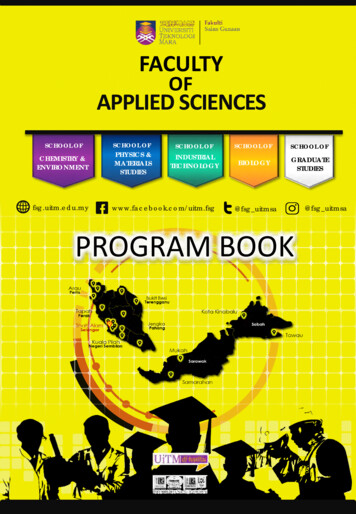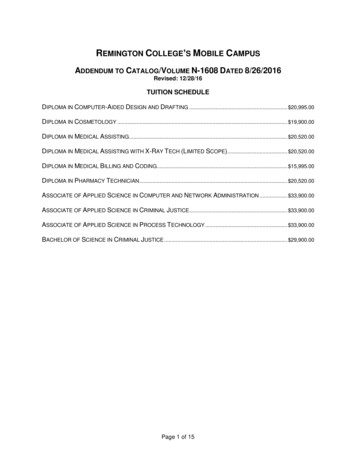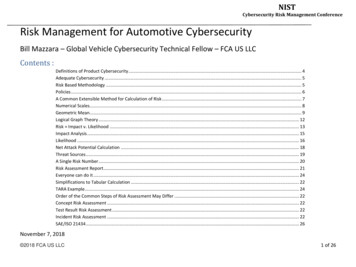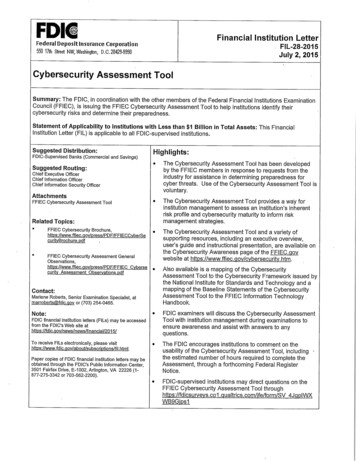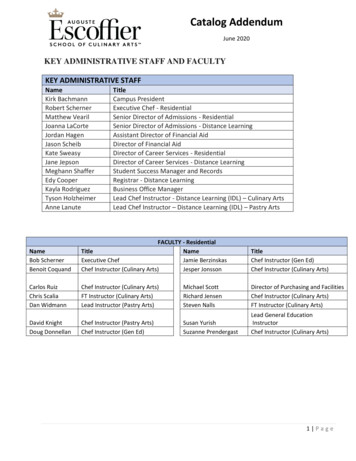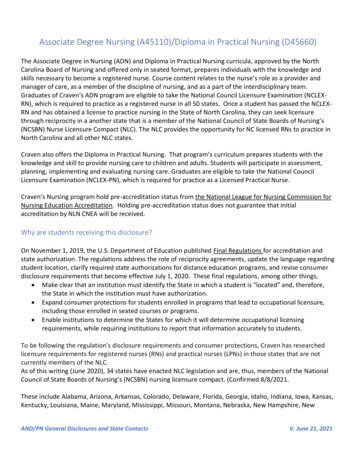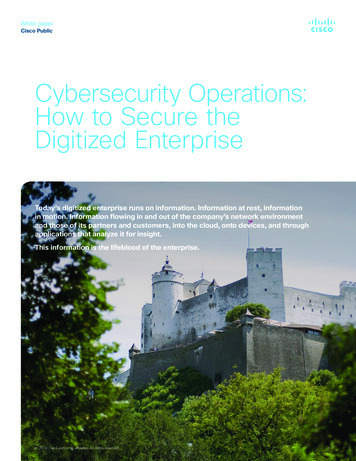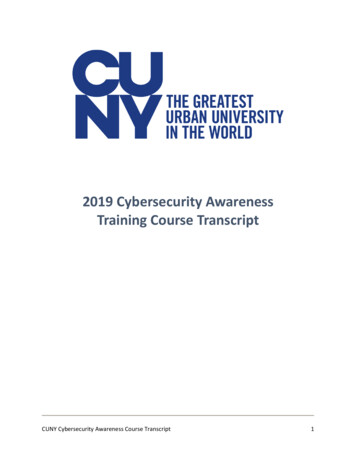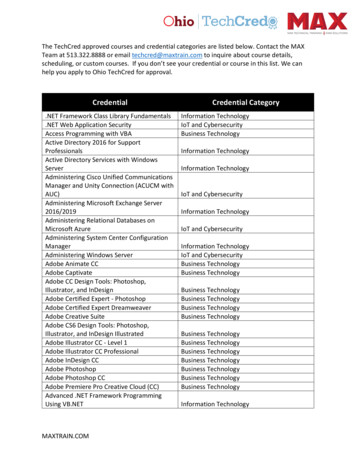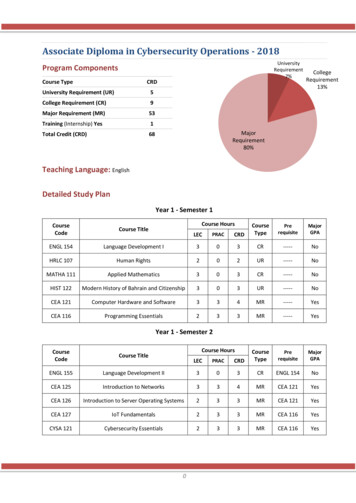
Transcription
Associate Diploma in Cybersecurity Operations - 2018UniversityRequirement7%Program ComponentsCourse TypeCRDUniversity Requirement (UR)5College Requirement (CR)9Major Requirement (MR)53Training (Internship) Yes1Total Credit ching Language: EnglishDetailed Study PlanYear 1 - Semester 1CourseCodeCourse TitleENGL 154Course age Development I303CR-----NoHRLC 107Human Rights202UR-----NoMATHA 111Applied Mathematics303CR-----NoHIST 122Modern History of Bahrain and Citizenship303UR-----NoCEA 121Computer Hardware and Software334MR-----YesCEA 116Programming Essentials233MR-----YesYear 1 - Semester 2CourseCodeCourse TitleENGL 155Course age Development II303CRENGL 154NoCEA 125Introduction to Networks334MRCEA 121YesCEA 126Introduction to Server Operating Systems233MRCEA 121YesCEA 127IoT Fundamentals233MRCEA 116YesCYSA 121Cybersecurity Essentials233MRCEA 116Yes0
Year 2 - Semester 3CourseCodeCourse TitleCYSA 231Course HoursLECPRACCRDCourseTypeLinux Essentials233MRCYSA 121YesCYSA 232Cybersecurity Operations I334MRCYSA 121YesCEA 235Routing and Switching Essentials334MRCEA 125YesCEA 236Entrepreneurship and Innovation233MRCEA 126YesCEA 237IT Career Development132MRPassing PAPrerequisiteMajorGPAYear 2 - Semester 4Course HoursCourseCodeCourse TitleCYSA 241Linux Administration334MRCYSA 231YesCYSA 242Cybersecurity Operations II334MRCYSA 232YesCEA 234Wireless Networks233MRCEA 127YesCEA 242Server Operating Systems Administration233MRCEA 236YesCYSA 291Applied Cybersecurity Design andDevelopment233MRPassing 50creditsYesTraining RequirementCourse CodeCourse TitleCEA 298Professional InternshipCourse RTrainingPassing 67creditsYes
Course DescriptionCourse Code:CYSA 121Course Title:Cybersecurity EssentialsThe course develops foundational understanding of cybersecurity and how it relates to information and networksecurity. The course introduces students to characteristics of cybercrime, security principles, technologies, andprocedures to defend networks. Through interactive, multimedia content, lab activities, and multi-industry casestudies, students build technical and professional skills to pursue careers in cybersecurity.Course Code:CYSA 231Course Title:Linux EssentialsThe course, developed and supported by Networking Academy partner NDG, teaches students the fundamentals ofthe Linux operating system and command line, and basic open source concepts. Students learn how to install &configure a computer running Linux, perform maintenance tasks with the command line, manage hardware anddisks, maintain the file system and edit text files.Course Code:CYSA 232Course Title:Cybersecurity Operations IThe course is the first of the two to achieve the CCNA Cyber Ops certification and is aligned with the job role of anassociate-level Security Operations Center (SOC) Security Analyst. It covers understanding of cybersecurity’s basicprinciples, foundational knowledge, and core skills of cybersecurity. It is also aligned to the Understanding CiscoCybersecurity Fundamentals Certification Exam (210-250 SECFND).Course Code:CYSA 241Course Title:Linux AdministrationThe course covers the fundamentals of the Linux operating system, system architecture, installation, command lineand file system. The course covers the Linux system architecture, Linux installation and packages, Linux commandline, device basics and the Linux file system. It is fully aligned to the Linux Professional Institute, LPI.org, LPIC-1 (orthe CompTIA Linux powered by LPI) first certification exam.Course Code:CYSA 242Course Title:Cybersecurity Operations IIThis course is the second of the two in achieving the associate-level CCNA Cyber Ops certification and is aligned withthe job role of an associate-level Security Operations Center (SOC) Security Analyst. It covers knowledge and skillsneeded to successfully handle the tasks, duties, and responsibilities of an associate-level Security Analyst working ina Security Operations Center (SOC). It is also aligned to the Implementing Cisco Cybersecurity OperationsCertification Exam (210-255 SECOPS).Course Code:CYSA 291Course Title:Applied Cybersecurity Design and DevelopmentCapstone course for the curriculum providing application of skills acquired in a "Real World" networkingenvironment applying cybersecurity solutions. Students test their ability to organize and interpret data, develop andapply cybersecurity operations solutions to problems and submit thorough documentation of the task including butnot limited to network design and prototype.Course Code:CEA 121Course Title:Computer Hardware and SoftwareThe course covers the fundamentals of computer hardware and software as well as advanced concepts. Studentswho complete this course will be able to describe the internal components of a computer, assemble a computersystem, install an operating system, and troubleshoot using system tools and diagnostic software. Additional topicscovered include laptops and portable devices, wireless connectivity and basic implementation and troubleshootingskills.Course Code:CEA 116Course Title:Programming EssentialsThe course will introduce students to Python, a general-purpose programming language used to build just aboutanything. The Programming Essentials in Python, students will learn to design, write, debug, and run programsencoded in the Python language. The course begins with step by step guidance until students become adept atsolving more complex problems.Course Code:CEA 125Course Title:Introduction to NetworksThis course introduces the architecture, structure, functions, components, and models of the Internet and othercomputer networks. The principles and structure of IP addressing, and the fundamentals of Ethernet concepts,media, and operations are introduced to provide a foundation for the curriculum. By the end of the course, students2
will be able to build simple LANs, perform basic configurations for routers and switches, and implement IPaddressing schemes.Course Code:CEA 126Course Title:Introduction to Server Operating SystemsThe focus of this course is on the use of network operating systems particularly Windows Server Operating Systemsin a business environment. Topics include business analysis, matching systems needs within appropriate networkconfiguration, data and systems security measures for user groups sharing files and resources, print services,network interconnectivity and related network management issues.Course Code:CEA 127Course Title:IoT FundamentalsIn this course, students will explore the three basics insights of the Internet of Things: Why do we want to connecteverything? What do we want to connect? And how do we connect everything? A typical IoT solution includessensors, local analytic abilities, network connections, and the ability to process and analyze the gathered data.Course Code:CEA 234Course Title:Wireless NetworksThe course introduces the fundamental concepts of wireless network administration including the various wirelessstandards, equipment and the relevant organizations. You will learn the terminologies and behavior associated withwireless technologies such as: radio frequencies, basic measurements techniques and antenna concepts used in theplanning and design of wireless networks. You will apply the skills learned and the basic parameters to configure awireless network, planning and building of wireless networks and techniques for securing and troubleshootingcommon wireless implementation issues as well as administration.Course Code:CEA 235Course Title:Routing and Switching EssentialsThis course describes the architecture, components, and operations of routers and switches in a small network.Students learn how to configure a router and a switch for basic functionality. By the end of this course, students willbe able to configure and troubleshoot routers and switches and resolve common issues with virtual LANs and interVLAN routing in both IPv4 and IPv6 networks.Course Code:CEA 236Course Title:Entrepreneurship and InnovationStudents acquire the knowledge and skills needed to manage the development of innovations, to recognize andevaluate potential opportunities to monetize these innovations, to plan specific and detailed methods to exploitthese opportunities, and to acquire the resources necessary to implement these plans. Topic includes designthinking, entrepreneurship, and growth and leadership. Entrepreneurship supplements the ICT skills gained in CCNAR&S curriculum by teaching business and financial skills, behaviors, and attitudes, to help students develop anentrepreneurial mindset.Course Code:CEA 237Course Title:IT Career DevelopmentThis course consists of a series of readings, exercises, and presentations designed to prepare students to succeed intheir IT careers. Topics include resume writing, personal networking, job search resources, interviewing,compensation negotiation, career development, and professional certifications.Course Code:CEA 242Course Title:Server Operating Systems AdministrationThe course will provide you with the necessary knowledge and skills to enable you to perform advanced serveradministration tasks in a network operating system environment, specifically in a Microsoft Windows network. Thecourse covers administrative tasks to manage a large number of system users and computers. You will learn toimplement and administer the Windows active directory services infrastructure in an enterprise environment. Itdescribes key decision points for naming, delegation of authority, and domain designs.Course Code:CEA 298Course Title:Professional InternshipsThe course is the application of the skills acquired in a real-world work-based environment. The Internship willprovide students with real-life experience applying skills learned in a classroom. Employers work closely with thestudents and teachers to ensure an environment that will enhance student’s education, provides experience andintroduces the student to the ICT Business environment.3
College Requirement Courses DescriptionsCourse Code:ENGL 154Course Title:Language Development IThe first of a series of three integrated language courses designed specifically for IT/CS and CE majors. Specialattention is given to IT related vocabulary, reading texts and writing.Course Code:ENGL 155Course Title:Language Development IIENGL 155 is the second of three integrated language courses designed for IT students. The level is upperintermediate.Course Code:MATHA 111Course Title:Applied MathematicsThe number system, Basic Algebra, Expansion, factorization, Transposition of formula, Solving Equations, Function,Definitions, Sequence and Series Relations, Differentiation, Standard Derivative, Integration and Applications,Matrices.University Requirements Courses DescriptionsCourse Code: HIST 122Course Title:Modern History of Bahrain and CitizenshipSpatial identity of Bahrain: Brief history of Bahrain until the 18th century; the historical roots of the formation of thenational identity of Bahrain since the 18th century; the modern state and evolution of constitutional life in Bahrain;the Arabic and Islamic dimensions of the identity of Bahrain; the core values of Bahrain’s society and citizenshiprights (legal, political, civil and economic); duties; responsibilities and community participation; economic changeand development in Bahrain; Bahrain’s Gulf, Arab and international relations.Course Code: HRLC 107Course Title:Human RightsThis course deals with the principles of human rights in terms of the definition of human rights, scope, sources witha focus on the International Bill of Human Rights; The Charter of the United Nations; Universal Declaration of HumanRights; The International Covenant on Economics, Social and Culture rights; Convention against Torture and otherCruel, Inhuman or Degrading Treatment or Punishment; Mechanics and the Constitutional Protection of Rights andPublic Freedoms in Kingdom of Bahrain.4
the CompTIA Linux powered by LPI) first certification exam. Course Code: CYSA 242 Course Title: Cybersecurity Operations II This course is the second of the two in achieving the associate-level CCNA Cyber Ops certification and is aligned with the job role of an associate-level Security Operations Center (SOC) Security Analyst.
